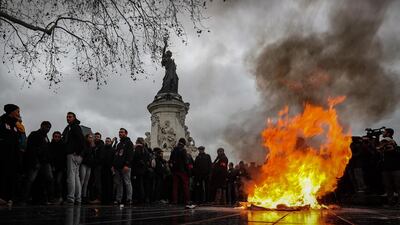French President Emmanuel Macron increasingly looked like a latter-day Louis XVI on Friday as the “gilet jaunes” prepared to stage fresh protests against a leader they branded “the president of the rich.”
Mr Macron remained holed up in the Élysée as Prime Minister Edouard Phillippe stepped up to the fore to quell the rebellion. This week Mr Phillippe announced a suspension of fuel taxes, promised to freeze a planned surge of electricity bills and dangled the possibility of future concessions, but the capital is bracing for its fourth round of protests as demands multiply rather than dissipate.
Since it began three weeks ago, the movement protesting environmental fuel tax hikes has spread well beyond its original grievances to encompass demands for better public services in rural areas, higher pensions and minimum salaries and the withdrawal of a reform impacting university entrance requirements.
This week a number of tax offices across France have come under violent attack by protesters donning the yellow high visibility vests. In Limoges, a tractor smashed into the entrance of the tax office, while in Poitiers 200 employees were taken to safety by police after protestors accused them of being “fascist collaborators.”
Across France, around 200 schools were closed or suffered disruption after students rose against government reforms that bring about changes to Baccalauréat examinations and university entry requirements and raise subscription fees for foreigners students.
The president is in danger of losing control of his capital city once again this weekend. His approval ratings have now dropped to 18 per cent, the lowest level in modern times after only 18 months in office.
Mr Macron so far refrained from imposing a new state of emergency or martial law in order to restore order. Calling out the army against his own citizens is likely to further escalate the violence and up the criticism against the president, who is already being lambasted for episodes of police brutality against protesters.
On Thursday, a video showing police patrolling over students kneeling on the floor with the hands bound behind their backs went viral on social media and sparked public condemnation.
The police operation, which occurred at a high school in the northern town of Mantes-la-Jolie, was part of a crackdown on days of protests over the government's education reforms,
The interior ministry said in a statement that more than 100 people were arrested in proximity of the school and that dozens of them were found to be carrying sticks, baseball bats and tear gas canisters.
But many observers did not condone how the authorities handled the situation. Cecile Duflot, the director general of Oxfam in France, said the video showed "intolerable" behaviour on the part of the police.
Former French education minister Benoit Hamon asked what authorities hoped to achieve by humiliating French youth. "This is not the Republic," he wrote in a Tweet.
Mr Macron appealed to his objectors on both sides of the political spectrum, inviting them to act responsibly. But interior ministry officials told French press agency AFP that authorities were bracing for "significant violence", based on indications that protesters on both the far right and far left are planning to take to the streets on Saturday.
The Parisian police prefecture invited business owners in the capital’s shopping district of the Champs Elysées to refrain from opening and barricade their windows to prevent damages.
Representatives of the public health sector said hospitals were taking additional measures to prepare for emergencies over the weekend. The protests have already led to four deaths and hundreds have been injured.
A survey by French daily Le Figaro found that Mr Macron's popularity has plunged lower than the approval rating for US president Donald Trump in France. Mr Trump – who is in many ways the political antithesis of Mr Macron – has seen his popularity among the French swell from 65 per cent to 80 per cent, while that of Mr Macron dropped from 27 to 18 per cent since the start of the protests.
The demise of Mr Macron could have dire consequences for France as well as for a European Union approaching its next parliamentary elections. Together with German Chancellor Angela Merkel – who recently announced her decision to step down as leader of the CDU at the end of her term in 2021 – the French president has stood up against the rising tide of populism that swept the bloc in the latest national elections.
Mr Macron’s vision of a global effort to combat climate change is also at stake. As world leaders gathered in Poland on Monday to kick-start the COP24 climate talks, Mr Macron stayed behind to deal with protests that are a direct result of the commitments to cut carbon emissions.
Despite being criticised for committing acts of vandalism, polls have shown that the “gilets jaunes” have the support of 70 per cent of the French public. If Mr Macron wants to keep his seat, he will have to find a cause that unites the French more than his own demise.

